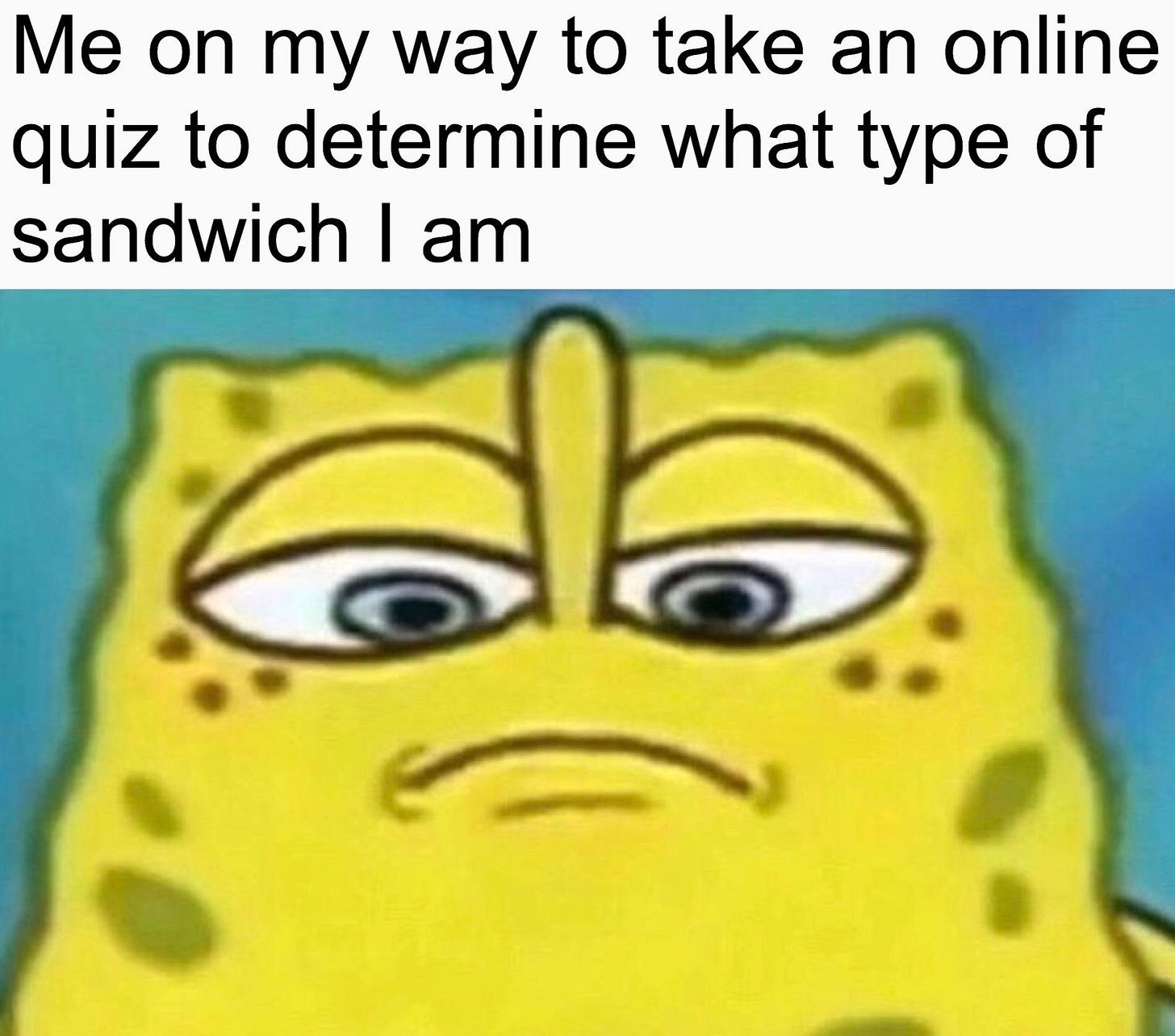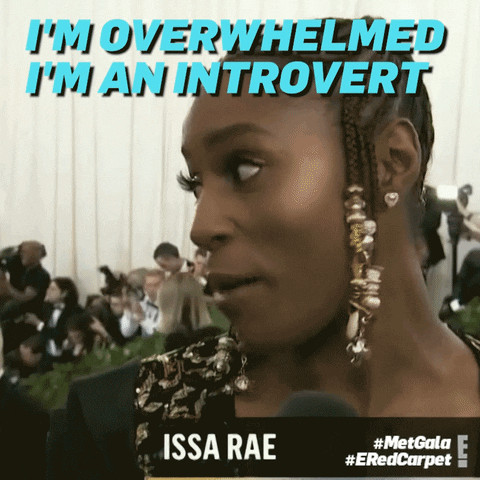‘’Are you an extrovert or an introvert?’’ 🤡
The concept of being an extrovert or an introvert has become generic to the point that you can learn what you are with 2-min BuzzFeed quizzes. People are labeling themselves with clear-cut definitions of personality — ignoring the wide spectrum where everyone has a unique standpoint. I think we see this generalization and romanticization of psychological phenomena or mental health especially in issues regarding OCD, ADHD, or depression. It’s not my intention to talk about the representation of mental health issues in media, but I had to mention the parallels between the two situations.
As I write this paragraph, I think about all the cheesy or professional (but all of them definitely inaccurate) personality tests I’ve taken so far. Especially when I was young and wanted to explore myself, how I communicate with others, and how I talk or act in social situations… And what better way to test our personality than an online test that holds the answer to who I really was?
My tests always said I’m an introvert, which was no surprise. Even though I wasn’t surprised, I still thought about what made someone an extrovert, was being an extrovert better, and then came the main question: ‘’Can I turn into an extrovert?’’. And I think this is what tired me the most, looking for the ‘’right answer’’ on how to be. I still think about whether I was extroverted enough on that night out with friends or at that family dinner — so that I wasn’t seen as this ghost whose presence is felt but is not seen. Cambridge professor Brian Little’s talk about personality has helped me come up with some answers that I’d like to share with you.
Before explaining extroversion, let’s start with the five universally held aspects of different people.
This is the OCEAN:
Open vs. closed to experience
Conscientious vs. lackadaisical
Extroverted vs. introverted
Agreeable vs. non-agreeable
Neurotic vs. more stable
Little says that among these five aspects, extroversion is the most “consequential and intriguing,” and gives some really good examples and explanations about how extroversion works:
☕️Need for stimulation
Extroverts love to be stimulated, they seek it. That’s why they like to go out, listen to loud music, and gather with other extroverted people. As Little puts it, extroverts form a magnetic core that attracts others as well. Introverts, on the other hand, need to lower stimulation. Have you ever slipped away from a party to hang out with the host’s dog instead? (Oh, how much I love seeing a pet at a house party.) Introverts know the satisfaction that comes with decreasing stimulation — it’s almost like meditating.
The important thing to know here is that this doesn’t mean introverts are necessarily anti-social. Rather, they feel the need to cool down sometimes. I’ll talk about this later in more depth.
Let’s quickly go over the two other factors:
🫱🏼🫲🏾Communication
Little explains that extroverts and introverts communicate differently. As you might guess, extroverts want to maintain eye contact and stand close to the person they are talking to, while introverts put a distance until they’re ‘’given a pass’’ to be more intimate.
🗣️Talking Style
Extroverts and introverts have different speaking manners. Introverts have a tendency to form rather complex and contextually deep sentences that Little calls “weasel-word sentences” while extroverts have black-and-white language.
We get it, extroverts and Introverts are different. What now?
As you might’ve noticed, there are some very clear-cut definitions of extroversion and introversion which we apply to ourselves, sometimes without notice. We are taught certain explanations about how certain people act, and there’s truth in them.
But are these traits all we are?
Why do we have this need to define our personality type?
It’s good to try and define who we are, but doesn’t it go sideways when we put ourselves in specific personality boxes?
These are the questions I started to ask myself when I realized I have lived with a guideline of how to be me, a clear set of rules that described me as an introvert which meant anti-social to me. After I realized that I might be a social person who shows introverted behavior, I stopped judging myself for my need to lower stimulation or simply be alone at times. I think, as humans, we like to ignore the spectrum of most things, and we create concise structures that make life less complicated. And sometimes, you need to destroy some of them.
I also want to add that this realization certainly didn’t happen overnight, and it’s not something that stops — you just continue to grow and learn. The other thing I learned from this realization is that we all have personal stuff that surpasses the superficiality of personality types.
We have personal values, goals, and projects that make people interested in you and love you. It’s good to remember what Little says ‘‘You're like some other people and like no other person’.’
⌛️A Little Retrospective
The big question: Can you fake being an extrovert?
…and if you faked long enough, could you actually be one?
To tell you how I answered these questions, I will take you to the beginnings of my career, where I intensely experienced self-judgment of my introversion and the pseudo-extroverted acts that really tired me. As someone who does content and community work, I communicate with lots and lots of different people (duh), but most times, it’s not easy to do. The more discomfort I felt in meetings, the more I led myself to believe I didn’t possess the skills needed for this career. Of course, this dark train might have pulled me back from opportunities to build meaningful social connections that I genuinely wanted to have. But as I said, my work’s nature wasn’t going to change (and it shouldn’t), so even though I had thoughts that held me back, I still needed to act like I loved being in social situations and having social interactions — like an extrovert. Let me tell you that it felt great from time to time and gave me the courage to improve my social skills. But I think the catch here is not to overdo it, as it might get tiring. So, what you really need is to have that balance that gives you social satisfaction but doesn’t throw you off.
I think I can see the glass half full and say that these experiences gave me a chance to leave my comfort zone, which would be true! In retrospect, I can say that my social skills have developed greatly, and it feels good. But for the longest time, I thought I faked extroversion to the point where I felt like one, and I was telling people that it works! You can indeed fake it ‘til you make it.
But to really answer your question… No, I didn’t turn into an extrovert. I just discovered that I’m an introvert who loves people. I stopped judging myself for wanting to lower stimulation and worked on balancing my pseudo-extroverted acts, which resulted in good social experiences. In case anyone has similar thoughts and wishes to find their social self, I have a few humble tips:
Find understanding and encouraging people
The people we surround ourselves with have a significant impact on our social development. You should seek out individuals who are understanding, empathetic, and supportive. These are the people who will listen to you without judgment, provide a safe space for you to express yourself, and offer encouragement when you need it most. Building a network of such individuals can help you feel more comfortable and accepted, allowing you to explore and embrace your social self without force. I’m telling you this because I’ve witnessed several occasions where the extrovert friend wants to go out, the introvert wants to stay at home, and they get annoyed. Sure, it can get more complicated than this, but the important thing to know is that friends should be able to understand each other’s needs and worries when it comes to social situations. Don’t be with people who make you feel bad because sometimes you need some time and space from all the extroversion.
Remember, people are not that scary
It's common to feel apprehensive about interacting with new people or participating in social activities. However, it's essential to recognize that everyone experiences similar emotions. People have their own insecurities, fears, and vulnerabilities. By reminding yourself that others are also navigating their social lives, you can approach interactions with a sense of empathy and understanding. This mindset can help alleviate anxiety and create a more relaxed and open atmosphere for connection.
I think instead of picturing everyone naked, you should picture everyone as vulnerable emotion chunks. It works better.
Set personal or professional goals
Setting goals, whether they are personal or professional, can serve as a roadmap to finding your social self. These goals can be as simple as attending social events, joining clubs or organizations that align with your interests, or initiating conversations with new people. By having clear objectives, you can push yourself outside of your comfort zone and actively engage in social activities. As you work towards these goals, you'll naturally encounter new experiences, meet different people, and gain a deeper understanding of yourself in social settings.
I remember Su Sakarya and I created this growth list for Sumi, and one of the things we needed to do more was to attend events, get to know people, and build good connections. We wrote ‘’leave your comfort zone’’, which is something I always hear but don’t take seriously most of the time — but this one was different.
In one of the events I attended last month, I listened to the presentations and the Q&A sessions, anxiously waiting for the networking time. When the time came, everyone got up and started talking to each other, and there was me, waiting at the corner for someone to come up and talk to me, but that wasn’t going to happen. I needed to initiate the social conversation I was looking for. Believe me when I say the words ‘’leave out your comfort zone’’ appeared in front of my eyes, and there I was, talking to the person I wanted to approach, introducing myself. Before I knew it, I met several others, got invited to a learning project, and left the building happy. This was possible thanks to Su and me setting a goal.
I also need to mention that, just before I left, there was this big & beautiful dog lying out front, and of course, I started to pet him. Turns out he’s quite popular there, and I met other people while petting him. Kids, sometimes it pays to spend time with the dog at parties. 🫶
It’s hard to end these😮💨
As for my final thoughts, I believe that you don’t need to be an extrovert or even act like one to develop social skills and have meaningful connections.
Introversion doesn’t mean anti-social
and even if it did,
✨We are more than a few traits. ✨








